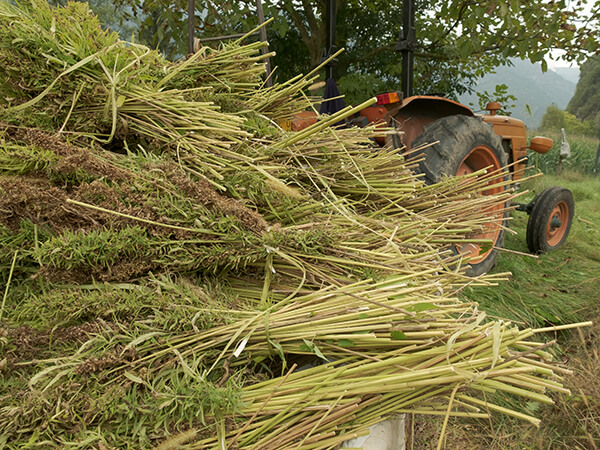Hemp, Sustainability
Top 4 Ways Hemp Farming Could Save our World
It is suggested that hemp was the world’s very first crop first planted over 10,000 years ago. Hemp fibers were used in fabrics for clothing, sails, and ropes while the seeds and leaves for medicines and nutrition. It was also used for currency and paper, as many of us know that the Declaration of Independence was written on hemp paper. The crop was so abundant and useful that many of the United States regions are named with it in mind—Hempstead, NY, Hemphill, KY, and Hempfield, PA.
The Stigma Holding Hemp Back
So, while we might consider hemp to be a modern crop, that is far from the truth. Unfortunately, hemp’s longtime association with Marijuana started in 1937 when Franklin D. Roosevelt signed the Marijuana Tax Act into law. The law limited the production of marijuana and included hemp in that mandate which meant the crop would suffer the same consequences.
By 1942 production had increased with the backing of the USDA with a campaign to bring back hemp for its original uses including naval material used in World War II, but by the 70s when the association with marijuana took its toll once again. It was included in the Controlled Substance Act signed into law by President Nixon in 1970. It was classified as a controlled substance along with Marijuana, methamphetamines, and heroin. Unfortunately, the stigma would be tied to the misleading federal government law which would penalize farmers for attempting to cultivate the crop.
Hope for Hemp
The landscape changed once again and this time with an optimistic forecast. The 2014 Farm Bill signed into law by President Obama would allow some farmers to grow hemp legally with some USDA and state oversight. In 2018 hemp was removed from schedule 1 of the Controlled Substance Act which legalized the production of hemp for any use which brings us to our purpose illustrating that hemp production is not just good for our planet. It’s great for our environment and might just help save our planet. Here is how.
4 Ways Farming Hemp Helps the Environment
- Sustainable Farming and More
Sustainable farming means that cultivating a hemp crop is sustainable in more than one way. The crop is conducive to crop rotation enriching the soil and increasing the yield. The crop will also remove toxins from the soil and air and requires less water than most crops. While cotton uses over 5,000 gallons of water to produce 2.2 pounds of cotton, hemp requires less than 1,000 gallons for the same yield.
Hemp is also capable of repairing damaged soil and reducing soil erosion. The long hemp roots will break up soil compaction and allow for better nutrient abortion. While we’re at it, we can say that hemp is pest resistant and can grow in almost any environment or climate. Hemp farming can make a bigger impact on our communities and our environment than almost any crop grown today.
- Wood Products and Plastics
With islands of non-biodegradable plastics floating in the ocean today we don’t need to tell you that situation is dire. American consumers are used to convenience and plastic offers it over any. According to Reuters, 481.6 water bottles were consumed in 2018 and that’s just water bottles. 6,300 metric tons of plastic waste were generated in 2015 and with the U.S. rate of recycling at a low 23 percent, these stats could only get worse. So why not hemp?
Hemp is said to be the most efficient and productive cellulose-producing crop on earth and it is zero waste which means 100% biodegradable from seed to consumption. The benefits of hemp plastic go well beyond those of petroleum plastic. It can be reused, recycled, and can replace the use of plastic, period.
Just like hemp plastic, hemp can be used to produce composite board products that are stronger and lighter than wood. Hemp products (hempcrete) are also used as concrete for insulation and soundproofing. The durability of hemp used in home building products is said to outlast that of wood two-fold. Hemp is non-toxic and mold resistant so, replacing fiberglass and drywall with hemp products will lead to safer cleaner homes and environments.
- Food and Fuel
Hemp is a stable crop that can be produced efficiently and abundantly to feed a starving world. It is an inexpensive crop that takes less water, is pest and mold resistant, and can be grown in almost any environment. Every part of the plant can be used to produce food and the waste can be used to produce feed or animals. It is a complete protein providing amino acids, vitamins, and nutrition that is dense and efficient. The seeds can also be used for oils and flours.
Like many fuel alternatives, Hemp biodiesel fuel can run in any diesel engine but can be used unmodified and is much better for the environment. Hemp biofuels are biodegradable, non-toxic and because it burns at a lower temperature than typical fuels, they produce fewer gasses impacting the environment.
- Air Pollution and Deforestation
Used as fuels, we have already discussed how hemp fuels are non-toxic and biodegradable, but when cultivated for farming, hemp actually captures carbon emissions from the atmosphere.
Much like trees, hemp absorbs carbon. For every ton of hemp produced, 1.63 tons of carbon is removed from the air. So, while we have already discussed the fact that hemp can remove toxins from the soil, it is also vital in removing toxins from the air.
Deforestation is the consequence of clear-cutting forests for wood and paper products and is a leading cause for concern on the benefit the trees offer out carbon footprint. So, the benefit of hemp for our air pollution, it can also replace trees as a sustainable and strong source of raw materials for wood and paper products. The hemp yield is higher, it is more efficient to cultivate, and it is a faster-growing crop.
Start Your Hemp-healthy Lifestyle
While these benefits are remarkable, they do not capture everything that the hemp crops could do for our economy and our environment. Hemp farming and plant production can create jobs, clean our atmosphere, feed, and clothe our communities.
At Kaya Hemp Co. we are fans. We are doing everything we can to get the word out and get you started on your journey to a hemp-healthy lifestyle. We carry everything from textiles, books, paper goods, backpacks, and bags to hair and skincare and pet products. For more on the products we carry and the benefits of each, visit us at the store or @kayahempco.
Resources:

